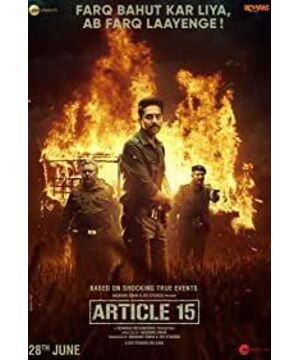On May 27, 2014, in the countryside of Uttar Pradesh, India, two girls "untouchables" were raped and killed and hanged from a tree to show the public:
"Article 15" is adapted from this real event. The evil of the caste system and the darkness of collusion between the police and the bandits resonated strongly with the audience. The box office sold well and the word of mouth was overwhelming.
Brahmin Samaj submitted a petition to the Supreme Court to ban the film, and Brahmin organizations held protests in major theaters, which virtually became a live advertisement for the film:
Article 15 of the Indian Constitution states that no one shall be discriminated against on the basis of caste, religion, place of birth.
However, the 2,000-year-old caste system and caste conflict still pervade the entire society. The untouchables of the lower castes do the dirtiest, hardest and most dangerous jobs:
Sanitation workers often go unpaid for months and dozens die every year from suffocation while cleaning sewers, according to the Cleaners Movement of India (SKA).
Three low-caste girls were gang-raped by the factory owner and the police for asking for a daily wage increase of 3 rupees (about 30 cents).
Unbelievable, three cents, two lives!
The executioner tried to deter the untouchables who dared to resist.
Untouchable scholar elites fought for the weak and were kidnapped and killed:
Politicians pull votes and fool the great alliance of nobles and untouchables:
The Indian police system is divided into two systems, one is the local police system, and the other is the federal police system (IPS) under the Central Ministry of the Interior. The members are all highly educated social elites, and they usually communicate in English.
Ayan belongs to the IPS police officer with a deep background and a promising future. Sooner or later, he will be transferred and promoted. He is desperate to find the real murderer, and it is difficult to get the cooperation of the local police: You are gone, what should we do?
Ayan isn’t Sherlock Holmes or Batman, nothing rhetoric or amazing, and that’s what makes the film at its best: low-key, down-to-earth, sober about the dark status quo, and eagerly anticipating a bright future.
In fact, some strange cases that seem to be covered by clouds and fog do not need Sherlock Holmes at all. The motives and behavior patterns of human beings have already been wiped out by criminologists and psychologists. How difficult is it to get to the bottom of it.
The wife of a pariah scholar always sees a star in her eyes whenever she mentions or sees her husband. Ayan looked at his wife thoughtfully: "When you look at me, there are no stars in your eyes. Is it because I am not good enough?"
Near Zhu Zhechi, in Sichuan dialect, learn from good people. When we meet a good person and appreciate a good work of art, we often have an impulse and desire to become better.
The production level of the film is very high, and the paragraphs where the police scum kills their mouths are natural and sudden:
A Yang, who was struggling to find a missing girl, was suspended, but he did not give up:
A dark, oppressive story with a bright, warm ending where justice is served—
Ayan asked the old mother what her caste was, and the old mother's reply was overshadowed by the sound of car horns, and people burst into laughter.
This leopard tail has a profound meaning: the ancient and unreasonable caste system will eventually be submerged by modern civilization.
I don't believe in chicken soup, I believe that every ethnic group has a backbone like Ayan and Dalit elites. Darkness is eternal, and light is eternal.
View more about Article 15 reviews











